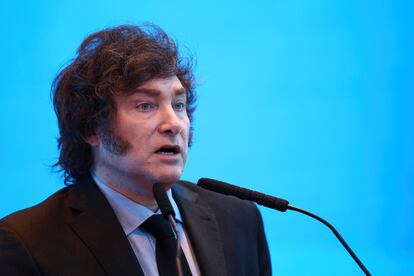Javier Milei’s government scrambles to defuse child labor comments by president’s ally
The Argentine government has distanced itself from the statements of La Libertad Avanza deputy Alberto Benegas Lynch and supports education as a tool against poverty


Argentina made primary education compulsory by law in 1884 and 99% of its population is literate, the second-highest rate in Latin America after Uruguay. The decline in the quality of education has been a matter of concern for successive governments, but this pillar of the Argentine state has never been questioned in the way one of the best-known deputies in President Javier Milei’s ruling party La Libertad Avanza, economist Alberto “Bertie” Benegas Lynch, has done. “You want to give your child the best and often it can happen, especially in Argentina, that you cannot afford the luxury of sending your child to school because you need him in the workshop with his father,” Benegas Lynch said Sunday during a radio interview. “How is the state going to decide about the boy? I can’t think of anything more invasive,” the congressman added in statements that have forced Milei’s government to distance itself from what they see as a personal opinion.
Benegas Lynch is the son of the eponymous intellectual whom Milei considers his biggest ideological reference. In Benegas Lynch’s opinion, education is “the parents’ responsibility” and, as such, the state should not intervene in it.
The legislator’s apparent defense of child labor earned harsh criticism from politicians, educators, and international organizations. “Working deprives boys and girls of their right to learn, play, and grow up happy,” UNICEF stated. “My father had to start working at the age of eight. Born in 1938 and the only child of a single mother, there was no alternative at home. Sadly, he passed away many years ago. If he were alive, he would tell the ignorant congressman in no uncertain terms what child labor is all about,” tweeted former Minister of Culture Pablo Avelluto.
The minimum working age in Argentina is 16 and employers who take economic advantage of child and adolescent labor are penalized. However, about 10% of the population aged between five and 15 in Argentina performs at least some productive activity, according to data from the International Labor Organization.
Government distances itself
The Milei government came out Monday to distance itself from Benegas Lynch’s comments. “What Congressman Benegas Lynch says is on behalf of Congressman Benegas Lynch,” presidential spokesman Manuel Adorni said in a press conference. “In the battle against poverty, the most important thing is to have the possibility of training, education, and a future,” he said regarding the official position. Milei himself described the congressman’s statement as an “unfortunate phrase,” but warned that some media should be avoided. “It was a mistake for Bertie to have gone to that place [radio station FM Millenium]. You have to understand that journalists play to destroy. You don’t [have to give] those journalists [anything], they are not interested in knowing how to think. They are interested in a phrase that hurts you,” the president said during an interview on Neura Radio.
The Ministry of Human Capital, the mega-ministry created by Milei that brings together the areas of Education, Labor, Social Welfare, and Culture, avoided direct confrontation with the pro-government Benegas Lynch but supported the current legislation. “Compulsory education was proposed in the context of liberal humanist thought precisely to promote the freedom of minors under the tutelage of adults,” wrote the Minister of Human Capital Sandra Pettovello on social networks. Compulsory education, according to Pettovello, “has often led to indoctrination or ideological monopoly, but this should not be followed by false solutions that fall into other absolutisms, such as that of parents over children.”
Pettovello’s words echoed that Milei’s government has launched a crusade against what it considers “ideological indoctrination” in schools and has announced that it will table a bill to punish any instances that come to light. To do so, the authorities will rely on complaints from citizens and plans to set up a system for parents and students to denounce “political activity that does not respect freedom of expression,” a measure that has been highly criticized by the education sector.
Sign up for our weekly newsletter to get more English-language news coverage from EL PAÍS USA Edition
Tu suscripción se está usando en otro dispositivo
¿Quieres añadir otro usuario a tu suscripción?
Si continúas leyendo en este dispositivo, no se podrá leer en el otro.
FlechaTu suscripción se está usando en otro dispositivo y solo puedes acceder a EL PAÍS desde un dispositivo a la vez.
Si quieres compartir tu cuenta, cambia tu suscripción a la modalidad Premium, así podrás añadir otro usuario. Cada uno accederá con su propia cuenta de email, lo que os permitirá personalizar vuestra experiencia en EL PAÍS.
¿Tienes una suscripción de empresa? Accede aquí para contratar más cuentas.
En el caso de no saber quién está usando tu cuenta, te recomendamos cambiar tu contraseña aquí.
Si decides continuar compartiendo tu cuenta, este mensaje se mostrará en tu dispositivo y en el de la otra persona que está usando tu cuenta de forma indefinida, afectando a tu experiencia de lectura. Puedes consultar aquí los términos y condiciones de la suscripción digital.








































